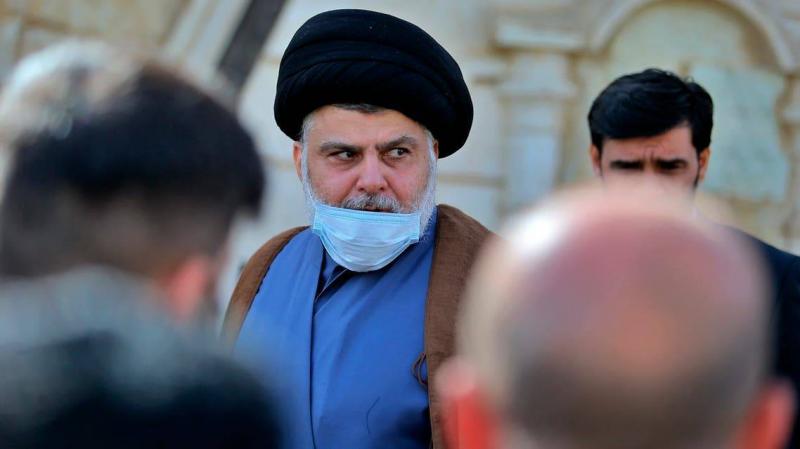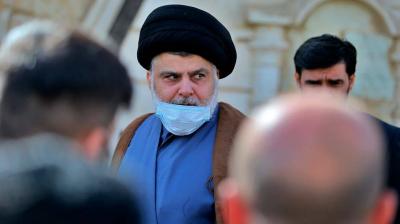The leader of the Sadrist Movement, Muqtada al-Sadr, surprised his partners in the "Triple Alliance" and his adversaries in the "Coordination Framework" with a phone call to Nouri al-Maliki, leader of the State of Law Coalition and former Prime Minister. Al-Sadr had imposed a "veto" on al-Maliki, the second winning Shia candidate after the Sadrist bloc in the October 2021 elections, since the start of political negotiations even before alliances were formed. Despite numerous meetings between al-Sadr and leaders of the Coordination Framework, which includes several Shia forces that had objected for months through protests and legal actions against the election results (including Fateh, State of Law, Asa'ib Ahl al-Haq, State Forces, Victory, and Al-Fateh), the main obstacle to reaching an agreement was al-Maliki.
Al-Sadr shocked the Coordination Framework when he came to Baghdad to hold a meeting with its leaders at Hadi al-Amiri's house shortly after the election results were announced, but failed to reach an agreement due to al-Maliki. After returning to his base in Al-Hanana in Najaf, he invited his Coordination Framework opponents for a visit in Najaf, stipulating that al-Maliki not attend. However, the leaders of the Coordination Framework rejected this offer on the grounds that excluding al-Maliki would weaken their position, especially as al-Maliki alone holds half the seats they all lost in the elections.
Due to al-Sadr's insistence on isolating al-Maliki, leaders of the Coordination Framework assigned the task of negotiating with al-Sadr to Hadi al-Amiri, leader of Fateh, who has a good personal relationship with the Sadrist leader. Al-Amiri's efforts failed, and he could not convince al-Sadr to include al-Maliki in his call for a national majority government. Meanwhile, the situation became more complicated following the parliament's failure to elect a new president and the Kurds' inability to agree on a unified candidate.
Everyone exited what was previously a bottleneck that they typically resolved amid past political crises, but with regional pressure—primarily from Iran—each was satisfied with their share of ministerial posts. However, this time the political scene reached what is now classified as "political stalemate." Kurdish leader Masoud Barzani seized on this stalemate, attempting to resolve it by launching an initiative aimed at persuading al-Sadr to lift the "veto" on al-Maliki, intending to pave the way for the election of his candidate, Hoshyar Zebari, for the presidency, before the painful decisions of the Federal Court against Barzani and his party (the Kurdistan Democratic Party) and their candidate Zebari.
Barzani's initiative, which was carried to al-Hanana by his nephew, Nechirvan Barzani, the president of the Kurdistan Region, alongside Parliament Speaker Muhammad al-Halbousi and Sovereignty Alliance leader Khamis al-Khanjar, failed. Two unexpected events occurred: first, al-Sadr addressed Nechirvan Barzani, asking, “Why haven’t you nominated for the presidency, especially since your Arabic is good?” adding that if he had done so, “we would have voted for you.” Zebari did not comment, but Masoud Barzani picked up on this implication, considering it an implicit objection to Zebari, especially as al-Sadr followed it with a tweet suggesting that he might not support Zebari unless his innocence from the allegations against him were proven.
Shortly afterward, the Federal Court decided to exclude Zebari, complicating the scene further between the parties involved, albeit quietly. Before exploring the implications of this complicated scene, it is necessary to mention another surprising event, which involved the attack on Sovereignty Alliance leader Khamis al-Khanjar at the shrine of Imam Ali ibn Abi Talib during a visit by the delegation that had traveled to al-Hanana for pilgrimage. While the Sunni Sovereignty Alliance did not pay much attention to the attack on its leader inside the sacred site, Masoud Barzani found it intolerable, whether for his uncle Zebari, who had been excluded from the presidential race, or the unexpected ruling by the Federal Court declaring the illegitimacy of the Kurdistan region's oil sales independently from the central government.
To read the scene and its repercussions, according to what transpired—from al-Sadr’s unexpected call to al-Maliki, along with his communication with leaders of the Triple Alliance (Masoud Barzani and Muhammad al-Halbousi)—a political source close to the developments told Asharq Al-Awsat that "al-Sadr has canceled the role of the facilitator he previously played in arranging matters and then reaching agreements among all parties, regardless of whether this facilitator was an external or internal actor; today, he is the one who acts and negotiates, as evidenced by his trips to Baghdad and his phone calls."
In response to a question about the timing of this call, including lifting the "veto" on al-Maliki, the source stated: "Many things have happened recently, including the deterioration of relations between the Sadrists and the Kurdistan Democratic Party, which has nearly reached a critical point, particularly after the Federal Court's decisions and Barzani's and the regional government’s lack of recognition of these decisions." The source added that "the same situation applied to the Sovereignty Alliance, especially since al-Sadr was very upset by the image of Sovereignty Alliance leaders al-Halbousi and al-Khanjar with Turkish President Erdogan in the presence of his intelligence director."
The political source continued, "After these events, along with the rising public dissatisfaction due to rising prices and the delay in forming the government as a result of the failure to elect a president, al-Sadr decided to shift the equation and rebuild alliances." He noted that "the call to al-Maliki comes in this context, which means that matters will take a different course with the Shia Coordination Framework, potentially paving the way for reaching understandings, especially since al-Sadr proposed his cousin, Jaafar Muhammad Baqir al-Sadr, the current Iraqi ambassador to London, as a candidate for Prime Minister." According to reports, al-Maliki informed al-Sadr that naming a candidate for Prime Minister is a matter for his Coalition, the Coordination Framework.
The Coordination Framework, for its part, decided to hold a special session to discuss the implications of al-Sadr's call to al-Maliki and what it could lead to, including the nomination of Jaafar al-Sadr for premiership. One of the questions that may arise from this situation is whether al-Sadr is willing to pay the price for nominating his cousin for the Prime Minister's position. That is, will al-Sadr concede 30 seats, the points that come with the prime minister's role, in exchange for gaining ministerial shares from the remaining 45 points, or not? The answer to this question from al-Sadr to the Coordination Framework leaders will shape the roadmap for the upcoming period—whether it leads to a stalemate that could lead to the dissolution of parliament and calls for new elections, or another bottleneck from which everyone exits with greater losses and fewer gains.




